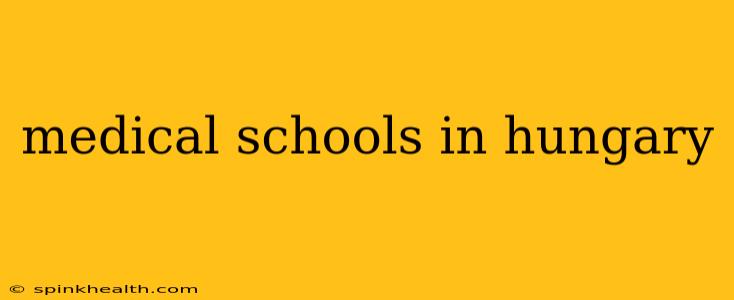Hungary's Hidden Gems: Exploring Medical Education Beyond the Borders
For aspiring doctors seeking a unique and enriching medical education experience, Hungary offers a compelling alternative. Beyond the bustling streets of Budapest and the stunning landscapes of the countryside, lies a rich history of medical training and a growing number of internationally recognized medical schools. But choosing the right path can be daunting. This journey will explore the landscape of medical schools in Hungary, answering common questions and revealing the unique advantages of studying medicine in this Central European nation.
What are the best medical schools in Hungary?
Choosing the "best" medical school depends entirely on individual priorities and preferences. However, several institutions consistently receive high praise and international recognition. Semmelweis University, in Budapest, is arguably the most prominent, boasting a long and distinguished history. It's known for its rigorous curriculum, excellent facilities, and strong research focus. Other reputable options include the University of Pécs Medical School, which has a long-standing tradition, and the University of Debrecen, often praised for its innovative teaching methods and strong clinical partnerships. Researching each university's specific programs, research opportunities, and faculty expertise is crucial for finding the best fit.
How difficult is it to get into medical school in Hungary?
Gaining admission to any medical school is competitive, and Hungary is no exception. The application process typically involves submitting academic transcripts, proving English language proficiency (most programs are taught in English), and sometimes taking entrance exams. The specific requirements vary depending on the university and the program. Strong academic performance in relevant pre-med subjects is essential, and demonstrating a genuine commitment to medicine through extracurricular activities or volunteer experience can enhance your application. While the competition is fierce, diligent preparation and a compelling application significantly improve your chances.
What are the admission requirements for medical schools in Hungary for international students?
Hungary welcomes international students, but the admission requirements can be quite specific. You'll generally need:
- High school diploma or equivalent: Ensure your qualifications meet Hungarian standards; you may need to undergo an evaluation process.
- Proof of English proficiency: TOEFL or IELTS scores are usually required, demonstrating a high level of English language comprehension.
- Letters of recommendation: Strong recommendations from teachers or mentors who can attest to your academic abilities and suitability for medicine.
- Entrance exams: Some universities may require additional entrance exams, which may test your knowledge of biology, chemistry, and other relevant subjects.
- Application fee: Be prepared for an application fee, which varies depending on the institution.
It's crucial to check the specific requirements of each university directly on their websites, as they can change.
Is it expensive to study medicine in Hungary?
Compared to some Western European countries or the United States, the tuition fees at Hungarian medical schools can be relatively affordable, although they vary depending on the university and program. However, living expenses in Hungary should also be considered, including accommodation, food, transportation, and other day-to-day costs. While Hungary offers a comparatively lower cost of living than many other European countries, meticulous budgeting is vital for international students.
What are the job prospects after graduating from a Hungarian medical school?
Graduates from Hungarian medical schools are well-regarded internationally. The quality of education and clinical training often meets international standards, making graduates competitive in the global job market. However, obtaining medical licensure in your home country may require further steps, including additional examinations or completing a residency program. The specific requirements vary significantly by country. Therefore, thorough research on licensing requirements in your target country is essential before starting your medical education in Hungary.
What is the language of instruction in Hungarian medical schools?
While Hungarian is the official language of Hungary, many medical schools offer programs entirely taught in English, catering to international students. This allows students from various linguistic backgrounds to participate fully in the academic and clinical settings. However, it is beneficial to learn some basic Hungarian to better immerse yourself in the culture and facilitate interactions with patients and local communities during clinical rotations.
This exploration merely scratches the surface of studying medicine in Hungary. Each university presents a unique profile, and diligent individual research is essential to find the perfect fit. The journey of becoming a doctor is long and demanding, but the rewards – both personal and professional – are immeasurable. Hungary, with its blend of affordability, academic rigor, and rich cultural experiences, may just hold the key to unlocking your medical aspirations.

